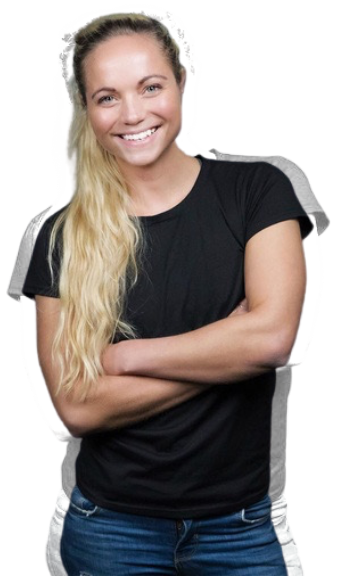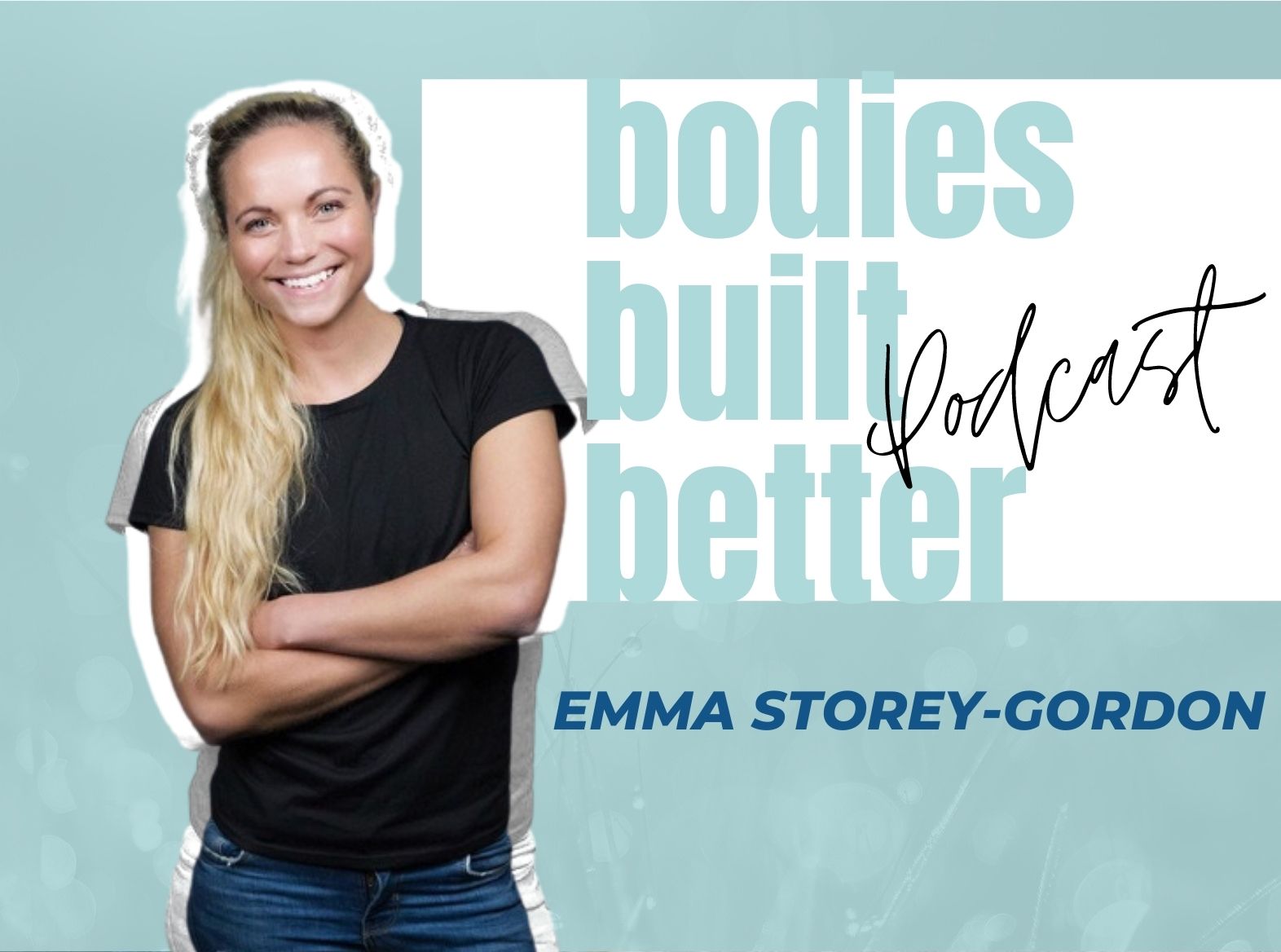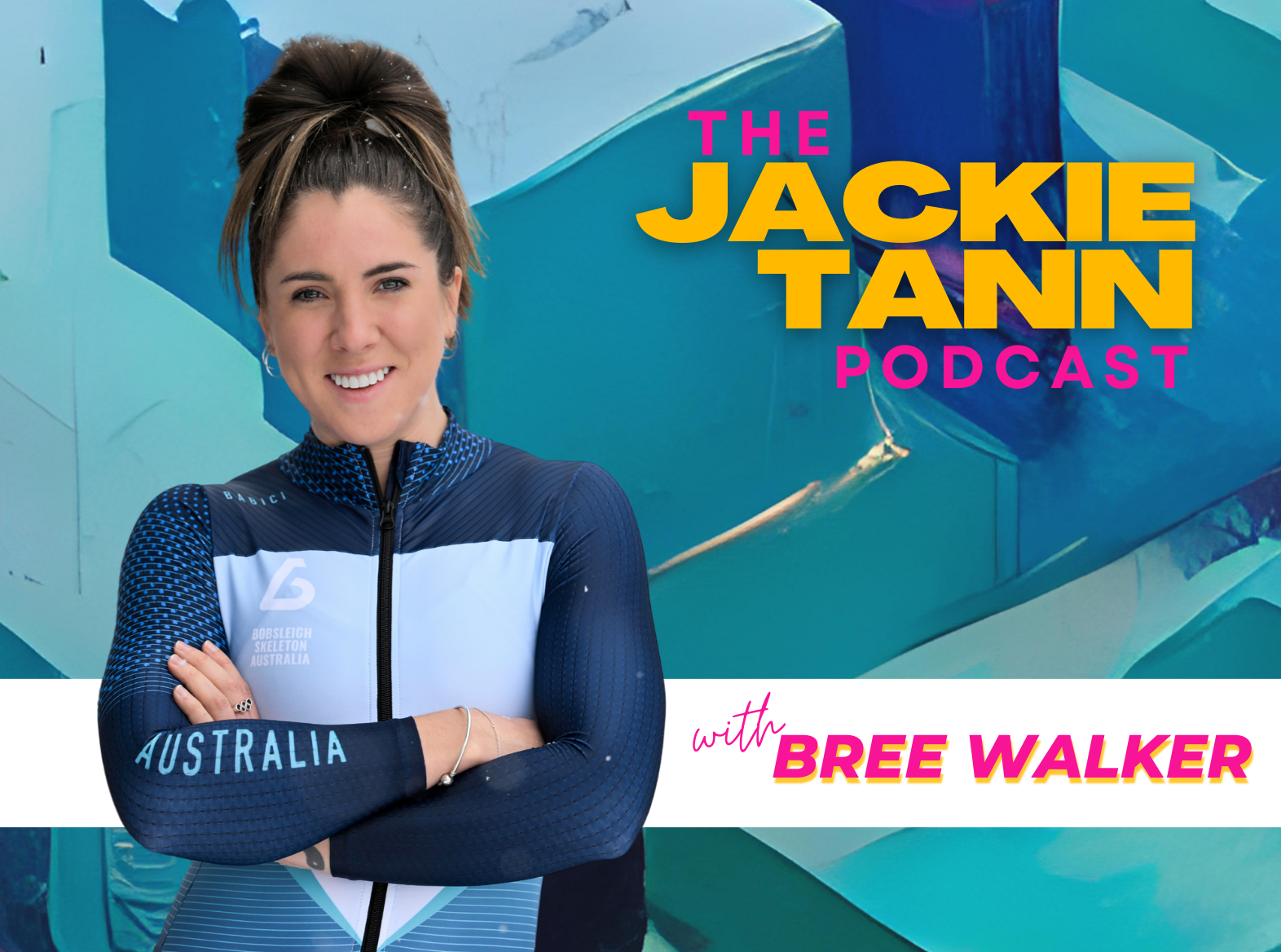How Emma Got Started With Fitness And Nutrition
Jackie 0:10
Today on the show, I chat with fitness and nutrition coach and researcher Emma Storey Gordon. Emma is fantastic at not only helping her clients achieve their fitness goals, but more importantly, her education around fitness, nutrition and mindset is what seeing her clients create long term sustainable changes. She has an incredible following on Instagram for very obvious reasons as she’s constantly answering questions. So everyone has the ability and opportunity to start making well informed positive changes immediately. She is down to earth generous with her time and teachings and I’m a huge stalker, I mean fan. I’m a big fan of hers. This episode is for everyone, as Emma has excellent advice around mindset and throws in some pretty hilarious analogies as well. So enjoy this episode with Emma Storey Gordon.
Emma, thank you so much for chatting with me today. I’m very excited to have you here. I think you’re pretty awesome. And you have this great ability to make nutrition digestible. Sorry, that is the only pun I got. So I had to put that in there. You’re always answering questions over on your Instagram. I just love the way that you know, we can learn from you and make really well informed decisions because of that. And you know, where we get answers to questions we didn’t even know we had because of that. So it’s really awesome so thank you for taking the time to chat with me today.
Emma 3:18
Oh, it’s an absolute pleasure. Thank you very much for having me,
Jackie 3:21
Pleasure is mine. And let’s get straight in. For those who don’t know too much about you. How did you get into your fitness and nutrition journey?
Emma 3:35
Okay, so I think probably similar to quite a lot of people, I have always been interested in sport. And then I went to university and I studied Sport Science. And it was only really in the last year that I realised I was less interested in most sport scientists’ work of elite level sport. But I was much more interested in how actually quite small changes could have huge impacts on people who are pretty sedentary or had things like type two diabetes, cardiovascular disease. So after university, I went and worked in cardiovascular disease and diabetes research for a couple of years, while being a personal trainer as well. And then I kind of fell out of love with the research world and a lot of lab work and decided to start my own business. And essentially what’s really cool that I’ve been able to do is bring together all the things that I really liked doing and pay myself to them, which is a really sweet gig that I’ve managed to do. So I run a nutrition course with my business partner, Amelia, which is called EIQnutrition. That allows me to still geek out on a lot of things, keep up to date with the research and still have that science background. And I run a coaching programme. I own numerous coaching programmes that actually help people lose weight on the surface, but also teach them a hell of a lot about nutrition, change their mindset around nutrition a bit and Enjoy the process as they’re doing it. And I also run a mentorship for personal trainers. So I kind of get to do a lot of different things which keeps me engaged and interested. And yeah, that’s really busy. Yeah, pretty busy.
How A Fitness Expert Recovers From A Back Injury
Jackie 5:16
Well, I love the mindset part of nutrition and fitness. So we’ll get into that in a moment. But I know you had a back injury not long ago. Can you tell us about that?
Emma 5:29
So I really wish there was a cool story. “Yes, I was squatting 150 kilogrammes. And suddenly, my back”, or “I was doing all the cool CrossFit workout”. Literally, nothing happened. So I’ve always had a bit of a bad back. And I used to row at uni. Crew rowing. And I think it just got worse and worse doing that. And then I mean, this is years and years after uni now. But I think this is actually kind of ironic, but I kind of decided right once and for all, I’m going to rehab my back and I went to a physio and I went to do it properly. And I started doing all these exercises. And it just got worse and worse and worse. And I thought this normally when it gets a little bit worse, right, this is when I normally stop. So this time, I’ll push through that. And maybe that’s part of the process, it’s meant to hurt a little bit. No, no. Bad idea. In hindsight, maybe you should not have done that. But basically, it just got worse and worse. I think what happened is, I don’t know, my back was very painful, but protected, what was going on down there, which, and I don’t know, it kind of loosened all that up. And essentially, a disc was impinging on my sciatic nerve. So for a while I couldn’t even sit down, I could barely walk. It’s really awkward at times, because I could walk a bit. And then I’d have to bend down so I’ll just be walking along the street and then squatting at the side of the road being weird.
Jackie 6:55
Oh, my shoe.
Emma 6:57
It was so strange. I remember being in Tesco once, the supermarket. And this girl, I don’t really know that well. Oh, hi, how are you? I had to bend down? I was like, “yeah, just looking at this. The crisps on the bottom shelf here, very interesting down here.”, so there were loads of things like that. But then I had surgery, which works extremely well, touch wood. And that was the whole rehab process around that. But it did teach me a hell of a lot. And you know, looking back as a bit of a silver lining it both, it’s definitely made me a better coach in terms of being more empathetic in terms of understanding what being in chronic pain is like, because it’s if you haven’t been in chronic pain, it’s very hard to understand that, and how fatiguing that is and how exhausting that is. And yeah, it made me do quite a lot of things. So I don’t know if you’re the same. But my coping mechanism, everyone has different coping mechanisms, whether that’s food for some people, alcohol for some people, and these coping mechanisms can be positive or negative. And actually, you know, having some is good, but the best thing to do is actually face what you’re dealing with instead of just trying to numb it with something else. So mine was definitely exercise. And most people see that as a good thing. Okay, well, yeah, that’s great, go and get your emotions out at the gym. And I think to an extent, that’s great, but if you’re just using it all the time, and kind of literally running away from your feelings, it can be a negative. So this injury really forced me to stop doing that. And to sort of take a bit of time, actually the long well, definitely the longest time that I’ve not been able to exercise. And I went to therapy. And yeah, it’s definitely made me in numerous ways a better person. And I learned a lot about myself. So yeah, it wasn’t all negative.
Jackie 8:57
Yeah. In terms of the recovery, what was that like? And were there differences between the recovery after surgery, and that physical therapy prior to the surgery, were there similarities in those at all?
Emma 9:14
So what was actually quite strange is there wasn’t really a rehab programme. I haven’t done much rehab for my back. So the surgery I got and the surgeon that I went to was very much like, “This is the problem. You know, part of your back is hitting the nerve, we essentially this is a very basic way to explain it, but we chop off that bit of your back, it doesn’t hit the nerve, the problem is gone”. So most of my recovery has just been obviously the initial recovery after surgery and being very careful. And then just slowly getting back into things and a lot of it was psychological. So pain doesn’t necessarily mean there’s a tissue problem all the time. And once you’ve had an injury for a long period of time, the pain can persist, even if the tissue injury is healed. And I had a lot of that and sort of anxiety around moving or re-injuring myself, or the expectation of pain, every time I used to bend down, I’d have pain. And I still had that pain, because of the expectation of that pain. And that was part of what I worked on, rewiring that. Then part of that was going to therapy and working through those kinds of things. And the fear of that, and I noticed still, I mean, noticing things is probably the first step to changing things. But as soon as I even get a twinge in my back, my mood is hell.
Jackie 10:40
Even now?
Emma 10:43
I mean, I’m a little bit better now. Because I noticed that’s happening. And I’m like, right, you don’t need to over catastrophize this. But normally, I’m like, I feel a tiny bit of pain. I’m like, that’s it back downhill back to like where I was. And I, a lot of music is backing up. Like I actually not quite sure how I got through that because it will it did get really, really bad. And then I don’t know if I would have the I mean, I would do it again. Of course I would everyone get through things. But yeah, I don’t want to have to go back there today. Yeah.
Jackie 11:13
Do you feel like you’re better equipped now though, to go through it? I mean, hopefully you don’t have to, but
Emma 11:20
I would say yes. And no, like, I think sometimes the unknown is quite good. Like, I didn’t realise it was gonna be that bad. I didn’t know, you know, you don’t know what’s gonna happen. You kind of just go with things, I didn’t really know that I was gonna need surgery. I didn’t know all these things. And you just get on and you take each day as it comes. That’s just generally how I live life anyway. But I think if you have a realistic expectation of potentially what might happen, that’s sometimes a worse thing. You know, and they say, when you’re training for a marathon or something like Don’t, don’t run the full marathon, just do that on the day. Like maybe you do that at 18 miles or something, but you don’t do the full 25 2046. somewhere around there. Yeah, sorry, like that. You don’t do the full marathon, because that last but you probably don’t need to know how painful that is. You experienced that, though?
Adopting The Right Mindset For The Fitness Journey
Jackie 12:18
All right. Well, let’s get into mindset because obviously, that’s a big part of anyone’s journey in, in, in weight loss or fitness, or in fact, anything in life. Yeah, life throws things at you. So when looking at setting fitness goals to begin with, what do you believe is the mindset we need to adopt before starting?
Emma 12:44
I think a trap that a lot of people fall into is wishing away time until they’ve reached that goal, or thinking that it’s going to be an awful process until they reach that goal or delaying happiness until they wait X amount, or stop not doing something until they weigh X amount, something like that. That’s a problem. I think, enjoying the journey is so important, because for a lot of these things, I mean, if if your goal is building muscle as a female, it’s gonna take a long time. And if you don’t enjoy it, you won’t stick to it. Simple as that. Yeah. So I think not wishing time away to get to that destination. And having that, you know, positive mindset that this, this can be fun and enjoyable, and you should enjoy the journey, because actually, you’re probably gonna have to do this for longer than you expect to get the result that you want. And it’s not really about reaching that result, like this is gonna sound a bit wishy washy. But any goal that you set, both massively matters and doesn’t matter at all at the same time. So really, the goal is like a direction and it gives you a bit of focus, that if you meet that goal or not, doesn’t really matter. And actually, when you reach it, you probably won’t feel any different. So who you become in the journey to getting there is far more important than if you get there or not. That’s partly why, like, setting big goals is quite good. Because that gives you a long term focus. Like say your business goal is to earn a million pounds in a year, great. When you get that won’t feel as sweet as what you think. You’ll be like, oh, okay, I hit that goal. That’s nice. But who you become and what you do to get there. And how many people you’ve helped as a personal trainer, how many people you’ve helped to get to earning that amount of money. That’s what matters. That’s what’s incredible. So the same is true with, like, a fat loss goal. And I hate scale weight targets. But say you have a scale weight target. Do you think you’re going to feel different when you weigh 60 kilogrammes compared to when you weighed 62? No, it’s completely arbitrary that that was like the number in your head. But who you become in the process of and how healthy you become the process of getting there. That’s like that’s what you’re looking for.
Fitness As A Journey
Emma 14:57
Yeah, so another analogy for this is like if you imagine a road trip, and you’re constantly thinking about getting to the destination, I can’t wait to get to the destination. That’s the end of the trip, right? you’re meant to enjoy the journey. Yeah, and stop worrying so much about getting to the destination. So that’s what I would say. And I completely understand why people have these connotations around dieting or fat loss or losing weight, that it’s going to be hard, horrible, like diet cultures kind of push that onto us that you should be suffering. And then you’ve got one side of diet culture, of like, do a 600 calorie a day diet, or just eat vegetables or juice or your meals or something like that. And then tea. Yeah, drink this tea and shit yourself. Alright. And then on the other side, which I don’t think she helps either is like bodybuilders who like you need to grind really hard, you get up at 6am. If you haven’t got results, you don’t want it hard enough. Now might write but there’s this huge, like grey area in the middle that I would call sensible and enjoyable dieting. And dieting is meant to make you feel better, not worse. If you’re overweight and you lose weight, you should feel like, well, if you’re resistance training as well, it’s stronger, happier, you can move better, you’re healthier. All these think that you should have more energy, not less. And I think if you’re doing it right, you’ll realise that you feel so much better.
Jackie 16:22
Yeah. And it’s sustainable. Hmm. Yeah.
Getting Over The Fear Of Starting
Jackie 16:29
What about those who are scared to start? And I guess I mean, those who are scared because of health concerns? Because I know they’re, you know, I’ve had some women in the past who have had thyroid issues and don’t want to either aggravated or or make it worse, or, or, or things like that. And you know, or someone’s got an injury, and they’re just afraid to make it worse, much like, you know, your thoughts around that surgery. And that fear of that coming back?
Emma 17:01
Yeah, I would say Firstly, only a couple of things here, start slowly. If it’s something to do with thyroid, or your metabolism, or PCOS, or anything like that they actually benefit, they’re benefited by exercise. So absolutely, if you’re unsure of anything, speak to a doctor, get there, okay, first, and make sure you’re working with someone who’s confident, and maybe has experienced working with the conditions that you’re dealing with. And honestly, if you have an injury, go and see a specialist about that injury and make sure that you’re doing the right things. But yeah, start and start slow. And that’s how you build confidence in anything and anything that you’re scared of doing. You just, you know, toe just outside that comfort zone. And then once you’re just outside that comfort zone that becomes your new comfort zone. And then you go a little bit further, like, if you’re terrified of going to the gym at the moment, fine. Can you do some workouts at home? Okay, now you’re a little bit more confident that you can exercise. Great. Now, can we add on some resistance training? Cool. Now can you just go into the gym, just to just go in. And then you can leave again, like go in and get an induction or just go in and just experience what it’s like, and then leave, you don’t have to do anything. And you’re just building that little confidence. You don’t have to suddenly walk into the gym into the weights area with all the men and feel completely intimidated and never want to go back again. You can just take small steps to get there.
Are Habits Important?
Jackie 18:23
Let’s talk habits. Okay, same pretty important. How do we start habits, but I guess more importantly, how do we keep them?
Emma 18:34
Yeah, habits are a big one in the fitness industry. Have you read atomic habits by James Clear?
Jackie 18:40
I have it, I have not read it yet.
Emma 18:44
So that’s a biggie. I think people read that and they’re like, this is this is like this is it. It’s habits, everything is habit. I actually don’t agree with it only because–and this is some of this is like semantics–but I think it’s important. So the definition of a habit is something that is like habitual but doesn’t require effort. So you might say like a habit I mean sometimes habits can be negative as well. They are, habits might be like sucking my thumb. I don’t even notice that I’m doing it and then oh god I’m psyching myself out like that will never be diet and exercise. It will always take effort. And I think giving the notion that at some point this will become completely easy and effortless. is totally misleading to people. But even you, as a personal trainer, I’m sure there are days you don’t want to exercise. I’m sure there are days that you’d rather get a takeout, then make your own meal in the evening. It never becomes completely easy. Sorry. I’m hoping it’s not–
Jackie 19:51
Don’t say it.
Fitness As Part Of A Routine
Emma 19:53
Don’t worry. It’s a Skype interview or not. So yeah, like, I don’t think it’s habits, but I think it’s routine. Routine makes things a hell of a lot easier. And that just being in your routine, and that being almost part of your identity and part of something that you do. So I’m in exercise, I do, you know, it’s just normal for me to go to the gym three times a week, I don’t have to put a huge amount of effort into that. But I’m not going to say it’s completely effortless all the time. And I think the expectation, that habits, or if you do something for 30 days, or 90 days or whatever, amount of days, six days, there you go 66 days, depending on what the habit is, if you do it for that long, it just becomes a habit and you’ll just do it. That isn’t true. That’s, that doesn’t happen. Yeah. But it can become part of your routine and routine is important. And routine does make things a lot easier. And it means that part of it’s like taking away the decision fatigue for you. So instead of kind of stressing every week, or when will I fit this in? When will I fit that in? How am I going to do this, it just becomes like something that you do, we’re not saying that it’s going to ever be effortless, but it does become easier.
Jackie 21:03
How do you make it a part of your routine?
Emma 21:06
By, by consistently doing it, and there are things you can do like you can, well, one plan ahead, you can make it the easiest option. So this is something that James Clear talks about in his book is setting things out. So actually, the action that you want to take is the easiest action. So let’s say you really, let’s say you’ve been like I’m gonna exercise in the morning as soon as I get up. But for the last three mornings, you’re like, oh, that actually didn’t happen. Okay, well, why don’t you set out all your workout stuff before you go to bed. So it’s actually harder for you not to work out. Or if you’re like, I want to go to the gym in the morning. And then most mornings, that hasn’t been happening, okay, well, can you go to your car and put your work stuff in, in your car, so that you would literally have to go out of your way to get your works off and come back inside and get changed if you weren’t going to the gym. Otherwise, you’re just going to drive to the gym with your work staff have a shower and get changed there, you have to go out of your way to, like, not do the action that you want to do. So you can sort of sway yourself in certain directions and create an environment that makes it easier for you to do the actions that you want that you said to yourself that you’re going to do.
How To Change An All-Or-Nothing Mentality
Jackie 24:19
I’ve been one in the past to have really high motivation. And then it’s go-all-in and then you crash and then it’s go-all-out. Seems to stop. So this all or nothing mentality. How, how can we change that is, is it just a matter of getting into that routine?
Emma 24:47
I think the first thing for changing anything is, one, realising you can do it, you can change so I think a lot of the time we think that personality is set. Say like, Oh, I’m just an all or nothing person. Just a perfectionist, nothing I can do about it. No, no, you’re choosing to stay there. Once you’ve noticed what it is you’re choosing to say that which is fine. But you have to own that choice. So if you’ve decided I didn’t like my all or nothing traits, or I’ve noticed that they don’t get me anywhere, they’re not beneficial to me. Now you’ve noticed it, now you can start changing it. So it’s realising your behaviours first, like, you can’t change something that you haven’t really noticed if you’re like, Okay, Hmm, yeah, I am pretty all or nothing. And actually, that tends to mean I’m just really on a diet and then really off the diet and it’s a bit of a cycle, and it’s not getting anywhere. Great. Now we can work on changing that. And one way to do that is to set those sort of baseline, non negotiables. And, and just to start questioning yourself, so like, the typical thing will be, you’ve been really quote unquote, good on your diet all week. And then someone offers you a cookie, and you’re like, Okay, I have a cookie, and then you think, awful. I’ve had one now, so may as well eat the rest. Okay, well, you stop there. Does that make any logical sense whatsoever? Like, would I do that in other situations? Would I? I don’t know. Spill a little bit of milk, and then be like, Well, spill the milk all over the table? No, of course not like other examples? Like, would you have one flat tire and then just think, may as well slash all my tires, because one of them is flat? It doesn’t make any sense yet.
Finding A Way Out Of A Binge-And-Restrict Diet Cycle
Emma 26:25
We do it with our diets. So it’s questioning your behaviours, and then also remembering, okay, what are the fundamentals here? For if fat loss is my goal? What’s the fundamental, I need to be over time and day to day doesn’t really matter? Over time, I need to create an energy deficit, so that my body is forced to use its own stores of energy for fuel, aka, my body fat for fuel. Then, will one cookie make a difference? Absolutely not. But well, then eating the rest of these mean that I’m potentially not in a deficit this week? Yeah, maybe. So actually, maybe I should stop here. And realise that just one fine, but eating them all, not so fine. And the impact that it has, because it’s not normally–I mean, even to a large extent, it’s not even the whole packet of cookies that you eat. It’s your mindset after it’s, well, I’ve ruined everything. Now. I might as well just eat crap for the rest of the weekend. And then I feel like crap on Monday. And then often that even turns into a bit of a binge-restrict cycle. So on Monday, I’m gonna see if I can eat 800 calories for the rest of the week. That will make up for what happened on the weekend. And then inevitably, by the next weekend, you’re like, I am literally starving. So you overeat, and, and you get into this cycle of overindulgence over restriction, and you’re constantly fighting. If you are listening, and you’re in that cycle. The reason that people can’t get out of it is because you’re constantly focusing on avoiding overindulgence. So you’re like, Hi, I don’t want to over eat this weekend, I’ll try and be really, really strict. And what you need to do is focus on removing the over restriction, because that is what’s causing the overindulgence. So you’re looking at, it’s essentially treating the symptom, not the cause. If you treat the cause, then you won’t over indulge. So stop that over restriction if you’re stuck in that cycle. And that, that should hopefully help you get out of it. And I know that’s easier said than done from a psychological level. But that’s, that’s the way out of that situation.
Follow Emma on Instagram at @esgfitness for fitness advice, @eiq_nutrition for nutrition, and @afmentors for business mentorship. You can also find her at www.esgfitness.co.uk. Check out more inspiring conversations in the Bodies Built Better Podcast archives!













